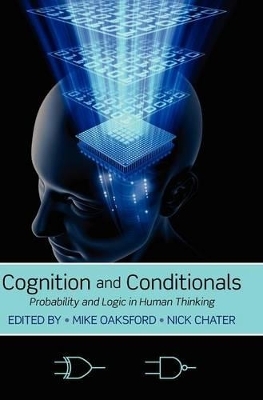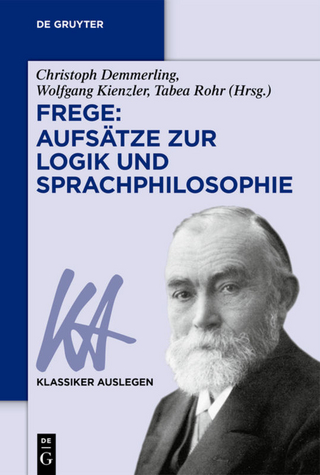
Cognition and Conditionals
Oxford University Press (Verlag)
978-0-19-923329-8 (ISBN)
The conditional, if...then, is probably the most important term in natural language and forms the core of systems of logic and mental representation. It occurs in all human languages and allows people to express their knowledge of the causal or law-like structure of the world and of others' behaviour, e.g., if you turn the key the car starts, if John walks the dog he stops for a pint of beer; to make promises, e.g., if you cook tonight, I'll wash up all week; to regulate behaviour, e.g., if you are drinking beer, you must be over 18 years of age; to suggest what would have happened had things been different, e.g., if the match had been dry it would have lit, among many other possible uses. The way in which the conditional is modelled also determines the core of most logical systems. Unsurprisingly, it is also the most researched expression in the psychology of human reasoning.
Cognition and Conditionals is the first volume for over 20 years (On Conditionals, 1986, CUP) that brings together recent developments in the cognitive science and psychology of conditional reasoning. Over the last 10 to 15 years, research on conditionals has come to dominate the psychology of reasoning providing a rich seam of results that have created new theoretical possibilities. This book shows how these developments have led researchers to view people's conditional reasoning behaviour more as succesful probabilistic reasoning rather than as errorful logical reasoning. It shows how the multifarious, and apparently competing, theoretical positions developed over the last 50 years in this area - mental logics, mental models, heuristic approaches, dual process theory, and probabilistic approaches-have responded to these insights. Its organisation reflects the view that an integrative approach is emerging that may need to exploit aspects of all these theoretical positions to explain the rich and complex phenomenon of reasoning with conditionals. It includes an introductory chapter relating the development of the psychology of reasoning to developments in the logic and semantics of the conditional. It also includes chapters by many of the leading figures in this field.
Cognition and Conditionals will be a valuable resource for cognitive scientists, psychologists and philosophers interested how people actually reason with conditionals.
Mike Oaksford is Professor of Psychology and Head of School at Birkbeck College London. He was a PhD student and subsequently a Research Fellow at the Centre for Cognitive Science, University of Edinburgh. He was then a lecturer at the University of Wales, Bangor, and a senior lecturer at the University of Warwick, before moving to Cardiff University in 1996 as Professor of Experimental Psychology, a post he held until 2005 when he moved to Birkbeck College, University of London. He has authored or edited seven books (four with OUP) and over 100 articles. His research interests are in the area of human reasoning and argumentation. In particular, with Nick Chater and Ulrike Hahn, he has been developing a Bayesian probabilistic approach to classical deductive reasoning tasks and to the classical fallacies of informal argumentation. He also studies the way the emotions interact with reasoning and decision making processes. Nick Chater is Professor of Cognitive and Decision Sciences at University College London. He was a PhD student at the Centre for Cognitive Science, University of Edinburgh. He was then a lecturer at University of College London, before moving to lectureships at Edinburgh and then at Oxford. In 1996 he moved to Warwick University as Professor of Psychology, a post he held until 2005 when he moved back to University College London. He has authored or edited seven books (three with OUP) and over one hundred and fifty scientific publications in psychology, philosophy, psycholinguistics, and cognitive science. His research explores formal models of inference, choice, and language.
1. Cognition and conditionals: An Introduction ; WORKING MEMORY: FUNCTION, REPRESENTATION, AND PROCESS ; LOGIC ; 2. The mental logic theory of conditional propositions ; 3. Conditionals and possibilities ; 4. Logic and/in psychology: The paradoxes of material implication and psychologism in the cognitive science of human reasoning ; 5. The logical response to a noisy world ; PROBABILITY ; 6. Conditionals and probability ; 7. Causal discounting and conditional reasoning in children ; 8. Conditionals and non-constructive reasoning ; 9. The conditional in mental probability logic ; LONG TERM MEMORY: FUNCTION, REPRESENTATION, AND PROCESS ; LOGIC ; 10. Semantic memory retrieval, mental models, and the development of conditional inferences in children ; 11. Counterexample retrieval and inhibition during conditional reasoning: Direct evidence from memory probing ; PROBABILITY ; 12. How semantic memory processes temper causal inferences ; 13. A successive-conditionalization approach to conditional reasoning ; 14. Pragmatic conditionals, conditional pragmatics, and the pragmatic component of conditional reasoning ; INTEGRATIVE APPROACHES ; 15. Reasoning with conditionals in artificial intelligence ; 16. Towards a reconciliation of mental model theory and probabilistic theories ; 17. Conditional inference and constraint satisfaction: Reconciling mental models and the probabilistic approach? ; 18. Towards a metacognitive dual process theory of conditional reasoning ; 19. A multi-layered dual-process approach to conditional reasoning ; 20. Two aspects of reasoning competence: A challenge for current accounts and a call for new conceptual tools ; EPILOGUE ; 21. Open issues in the cognitive science of conditionals
| Erscheint lt. Verlag | 22.4.2010 |
|---|---|
| Verlagsort | Oxford |
| Sprache | englisch |
| Maße | 176 x 253 mm |
| Gewicht | 896 g |
| Themenwelt | Geisteswissenschaften ► Philosophie ► Logik |
| Geisteswissenschaften ► Psychologie ► Allgemeine Psychologie | |
| Geisteswissenschaften ► Psychologie ► Test in der Psychologie | |
| ISBN-10 | 0-19-923329-2 / 0199233292 |
| ISBN-13 | 978-0-19-923329-8 / 9780199233298 |
| Zustand | Neuware |
| Haben Sie eine Frage zum Produkt? |
aus dem Bereich


